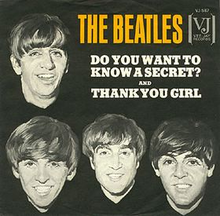Thank You Girl
| "Thank You Girl" | ||||
|---|---|---|---|---|
 US picture sleeve | ||||
| Singlebythe Beatles | ||||
| A-side | "From Me to You"(UK & US 1st release) | |||
| Released |
| |||
| Recorded | 5 & 13 March 1963 | |||
| Studio | EMI,London | |||
| Genre | Merseybeat[2] | |||
| Length | 2:01 | |||
| Label |
| |||
| Songwriter(s) | McCartney–Lennon | |||
| Producer(s) | George Martin | |||
| The Beatlessingles chronology | ||||
| ||||
"Thank You Girl"is a song recorded by the English rock bandthe Beatles,written byJohn Lennon and Paul McCartney.It was issued as theB-sideof the single "From Me to You",which was recorded on the same day (5 March 1963). While not released on anLPin the United Kingdom untilRaritiesin 1978, the song was the second track onThe Beatles' Second Albumin the United States. As the B-side of the single "Do You Want to Know a Secret",it hit No. 35 on theBillboardHot 100in the spring of 1964.
Background
[edit]Originally titled "Thank You, Little Girl",[3]the song was written byJohn LennonandPaul McCartneyas a tribute to the band's many female fans. McCartney said, "We knew that if we wrote a song called, 'Thank You Girl', that a lot of the girls who wrote us fan letters would take it as a genuine 'thank you'. So a lot of our songs were directly addressed to the fans."[4]Written “eyeball to eyeball", a phrase Lennon and McCartney would later use to describe their early formulaic writing sessions, "Thank You Girl" demonstrates how they were able to produce a song from scratch by working in total partnership. Lyrically,Ian MacDonaldsuggests that Lennon probably wrote the first line of each verse, allowing McCartney to use his flair for word play and inner-rhyming in completing it.[5]
Lennon said the song was originally intended as a single: "'Thank You Girl' was one of our efforts at writing a single that didn't work. So it became a B-side or an album track."[6]In April 1972, he toldHit Parader,"[The song was written by] Paul and me. This was just a silly song we knocked off." McCartney seemed to agree describing it as "a bit of a hack song, but all good practice."
Both "From Me to You" and "Thank You Girl" were credited to "McCartney–Lennon", as were eight of the songs on thePlease Please Mealbum. It would be permanently changed to the more familiar "Lennon–McCartney"songwriting credit for their next single release,"She Loves You".
Recording
[edit]The song was recorded in thirteen takes, the same number of takes needed to perfect "From Me To You" on 5 March 1963. This recording session is also notable because it marks the first studio appearances of two Lennon–McCartney songs that would not be released until much later in the band's career: "One After 909"(later re-recorded, appearing onLet It Be) and "What Goes On"(later re-recorded, appearing onRubber Soul,credited as Lennon–McCartney/Starkeyto reflect Ringo's contribution to the lyrics). Although both songs were rehearsed, only "One After 909" was recorded, and even then the results were deemed unsatisfactory for release.
John Lennon overdubbed the harmonica without the other Beatles eight days later. According to multiple sources, John came to the session directly from bed due to a severe cold. EngineerGeoff Emericksaid it took John numerous takes to produce a satisfactory result because he was so unsteady.
The stereo mix of the song (included on the Capitol LPThe Beatles' Second Album) is noticeably different from the original single mono mix (re-released on CD in 1988 on the compilationPast Masters, Volume One) in themiddle 8.In the stereo version, a couple of extra harmonica lines can be heard, as well as at the very end of the song. In addition, this stereo mix contained reverb added by Capitol. The unadulterated stereo mix was released for the first time on the 2009 remastered CDPast Masters.[7]
Cover versions
[edit]The song was covered bythe Smithereenson their 2008 albumB-Sides The Beatles.[8][importance?]
Personnel
[edit]- John Lennon–double-trackedvocal,rhythm guitar, harmonica
- Paul McCartney–harmony vocal,bass guitar
- George Harrison– lead guitar
- Ringo Starr– drums
- Personnel perIan MacDonald[9]
Notes
[edit]- ^Wallgren 1982,p. 17.
- ^"Pop/Rock" British Invasion "Merseybeat".AllMusic.Archivedfrom the original on 28 July 2013.Retrieved19 September2013.
- ^Lewisohn 1988,p. 28.
- ^The Beatles Interview Database 2007.
- ^MacDonald 1997,p. 71.
- ^Sheff 2000,p. 169.
- ^Brennan 2000.
- ^Deming, Mark.B-Sides the BeatlesatAllMusic.Retrieved 27 December 2016.
- ^MacDonald 2005,p. 80.
References
[edit]- Brennan, Joseph (17 May 2000)."The Usenet Guide to Beatles Recording Variations: 1963".
- Lewisohn, Mark(1988).The Beatles Recording Sessions.New York: Harmony Books.ISBN0-517-57066-1.
- MacDonald, Ian(2005).Revolution in the Head: The Beatles' Records and the Sixties(Second Revised ed.). London: Pimlico (Rand).ISBN1-84413-828-3.
- Sheff, David(2000).All We Are Saying: The Last Major Interview with John Lennon and Yoko Ono.New York: St. Martin's Press.ISBN0-312-25464-4.
- "Thank You Girl".The Beatles Interview Database.2007.Retrieved19 December2007.
- Wallgren, Mark (1982).The Beatles on Record.New York:Simon & Schuster.ISBN0-671-45682-2.
- MacDonald, Ian(1998).Revolution in the Head: The Beatles' Records and the Sixties.London: Pimlico (Rand).ISBN0-7126-6697-4.
